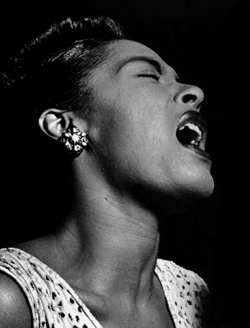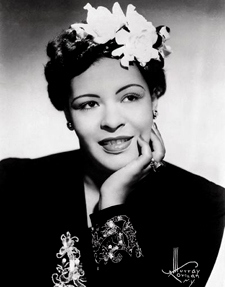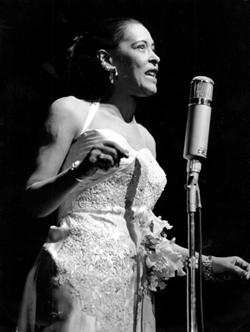 Tough times. Billie Holiday knew about them and sang about them. She had a rough start—her mother, Sadie, was only 13 and her father, Clarence Holiday, was 15.
Tough times. Billie Holiday knew about them and sang about them. She had a rough start—her mother, Sadie, was only 13 and her father, Clarence Holiday, was 15.
Sadie Fagan had been thrown out of her house and had moved, alone, from Baltimore to Philadelphia. She gave birth to a daughter, Eleanora, on April 7, 1915, and attempted to raise the girl on her own. Clarence was a musician and eventually went on to play guitar and banjo in Fletcher Henderson’s band. The two married for a very short time when Eleanora was 3 years old, then split up for good.
Sadie and young Eleanora did move back to Baltimore for a while, but their fortunes didn’t improve. Eleanora skipped school a lot, was sexually assaulted at age 11, and was then sent to a Catholic reform school. When she was released two years later, mother and daughter both moved to New York City to try their luck there. They soon discovered that they had no luck at all; Eleanora was again assaulted and soon found herself in all sorts of trouble.
It was the early 1930s: Out of desperation and out of ideas, Eleanora decided to try show business. She auditioned as a dancer for a nightclub and was a rousing failure. Only then did it occur to her to try singing, which met with moderate success. She was able to get by singing for tips in various nightclubs. But then on one particular night, totally broke and facing eviction, Eleanora sang her heart out to the tune “Travelin’ All Alone,” moving everyone to tears. It was then that people discovered that she really could sing, and it didn’t take long for her to be discovered by talent scout and record producer John Hammond.

“Eleanora Fagan” wasn’t a catchy enough name, so Eleanora chose to call herself “Billie” after Billie Dove, one of her favorite actresses, and then adopted her dad’s last name.
Billie Holiday’s recording debut was in 1933 with clarinetist Benny Goodman’s band, followed by a collaboration with pianist Teddy Wilson. “What a Little Moonlight Can Do” and “Miss Brown to You” were two of her early hits. Soon she was recording under her own name and was singing and swinging with the best bands around, including Count Basie, Artie Shaw, and Duke Ellington. The early days weren’t always rosy: while performing in Detroit, Billie had to appear in blackface because some felt she wasn’t quite dark enough.
Dubbed “Lady Day” by saxophonist Lester Young (who she in turn nicknamed “Prez,” short for President), Billie Holiday quickly became one of the most popular jazz vocalists of all time. She had a plaintiff sound, a longing that made you listen to the words. She played with the melodies, sometimes reducing songs to three or four notes like a blues guitarist taking a solo. Her emotions were close to the surface—often she took the audience through the wringer right with her.
Two songs that are even now associated with Billie Holiday are “Strange Fruit” and “God Bless the Child.”
A Jewish schoolteacher had written a poem about the horrors of lynching; it had been set to music and was sometimes performed at teachers’ union meetings in the Bronx. Billie was introduced to “Strange Fruit” and the words haunted her. She wanted to record it, but Columbia wasn’t willing to take the chance of having her record such a controversial song. They temporarily suspended her contract, which allowed her to record the song on Milt Graber’s Commodore label.

“God Bless the Child” was far less controversial, although the words were critical of people who turn their backs on those in need. Billie only had to examine her own life to write the lyrics.
Trouble continued to trail Billie Holiday around every corner. Drinking and drug problems, relations with the wrong men, arrests, a stint in jail, and the revocation of her NYC cabaret card (which kept her from performing in New York for the last decade of her life), eventually led to a tired soul and failing health.
She lost some of the musicality of her voice but not the tragic, raw emotion that continued to move audiences. Her last public appearance, a benefit concert in New York’s Greenwich Village, was in 1959.She could only make it through two songs. A couple of months later, she was in the hospital for liver and heart disease, and to add insult to injury, was charged with drug possession and handcuffed to her hospital bed. She died at age 44 on July 17, 1959 with 70¢ in the bank.
Today, Billie Holiday is remembered as one of the most sensitive and expressive of vocalists. As noted by one of her fans, no one sang the word “love” like she did—she spent her whole life in search of it and never quite found it.
[Billie Holiday recorded on the Columbia, Commodore, Decca, and Verve labels. In addition to the songs mentioned above, some of her best-known songs are “Fine and Mellow,” “Don’t Explain,” and “Good Mrning, Heartache.”]


